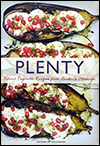 Plenty
PlentyYotam Ottolenghi, 2010
Every so often I do a writeup of the cookbooks I have recently checked out of the library, and this one appeared in November’s roundup. No need to click on that link, because here’s what I said:
When Marco Pierre White had a falling out with the Masterchef Australia team, his annual weeklong mentorship was taken up by Yotam Ottolenghi, who initially made me go “Wait, who?” but who by the end of the week left me pretty intrigued. I’m not generally a fan of eastern Mediterranean food, but I couldn’t help but try a vegetarian cookbook which had not only received rave reviews but whose complaints read like recommendations: He’s totally concerned with flavor and doesn’t seem to care about health! This food doesn’t make me feel virtuous at all! Not everything I tried was revelatory, but when my three weeks were up, I returned this to the library and bought my own copy. Because, holy smokes, that zucchini strozzapreti was revelatory. It seems simple—pasta, zucchini, cheese, olive oil, herbs, not much else—but it’s so much more than the sum of its parts. Alchemy! And then when I found myself playing a culinary road game, making this same recipe in a kitchen where the olive oil had a hundred times the bite of mine and with no equipment to make pesto as the instructions call for, it still came out delicious—but in a totally different way. That’s where you cross the line from alchemy into magic. So, yeah, I now own this cookbook, but have not returned to it yet, so at the moment while I know this will eventually get a good grade I don’t know whether that’ll be a 10 or a 20. Stay tuned.
Other than old favorites, this is the only cookbook I have made recipes from in 2018; it looks like I’ve made twenty‑eight dishes in addition to the eight I made when I checked it out of the library last year. The hit rate in 2017 was three very good dishes out of eight; in 2018 it is fifteen out of twenty‑eight so far, plus seven more that weren’t worth the effort to make but which I would happily eat again if placed in front of me. That is a pretty amazing hit rate—nearly twenty delicious dinners in a single volume, and I haven’t even tried every page of the book!—so I reckon that the good grade I promised will be a 17 at minimum. It’s not as comprehensive as some of my other cookbooks, like the Jack Bishop “how to make a pasta sauce out of any vegetable” book or Deborah Madison’s “how to cook basically any vegetarian dish” tome, but it does offer more variety than the “eastern Mediterranean” label above would suggest: there’s Chinese food in here, Italian, Mexican, you name it. Its biggest strength is what in November I called “alchemy”: dishes that, like the zucchini pasta I mentioned, look sort of humdrum at first but turn out to be inexplicably amazing. I can’t count the number of cookbooks I’ve turned to over the years for a good lentil recipe, but the only one that didn’t turn out utterly boring was Vij’s version with brown rice and coconut milk—one of my favorite things to make, but one in which the lentils are far from the lead player. Plenty has a version that’s a lot more straightforward: just aromatics and herbs, really. And yet this precise combination of aromatics and herbs elevates those lentils to a worthy meal. Another recipe goes a step further and has the lentils prepared with some spices, a different bunch of herbs, a handful of spinach, and a little yogurt. That one was so good that I found myself impatiently waiting to get hungry again so I could make another batch. What really made me see alchemy in action, though, was a recipe that at first seemed like a misfire. It was a cauliflower dish with saffron, and it was very blah. Then I noticed that, while it wasn’t actually in the list of ingredients, the introduction suggested, “To upgrade, drizzle with tahini sauce.” I still had enough ingredients left over for a remake, so the next day I tried again, this time with the tahini. It was infinitely better. Tahini sauce on its own is terrible! The cauliflower dish on its own was boring! Yet put them together and suddenly I had something that could be served in a good restaurant.
That’s what makes this pretty much the ideal cookbook as far as I’m concerned. I don’t need a book to tell me, as a lot of “cooking made simple” cookbooks do, that to make a dish that tastes like peas and carrots I should combine peas and carrots. On the flip side, any cookbook that relies on uncommon skill, expensive equipment, or unobtainable ingredients is pretty much going to be lost on me. But a cookbook which, on page after page, lays out a collection of basic ingredients (mostly herbs and spices) that, in the specified ratios, add up to create flavors that are unusual and delicious? That’s the sort of cookbook you can make dinner out of for half a year without getting anywhere close to bored.
 |
|||||
 |
 |
 |
 |
||
|---|---|---|---|---|---|
Tumblr |
this site |
Calendar page |
|||